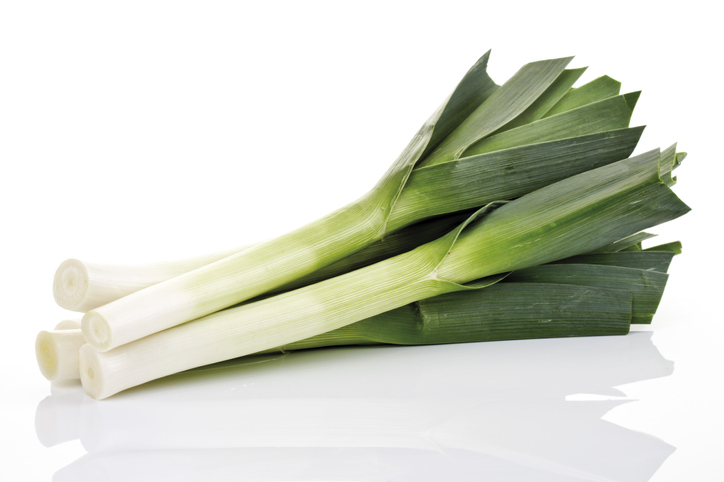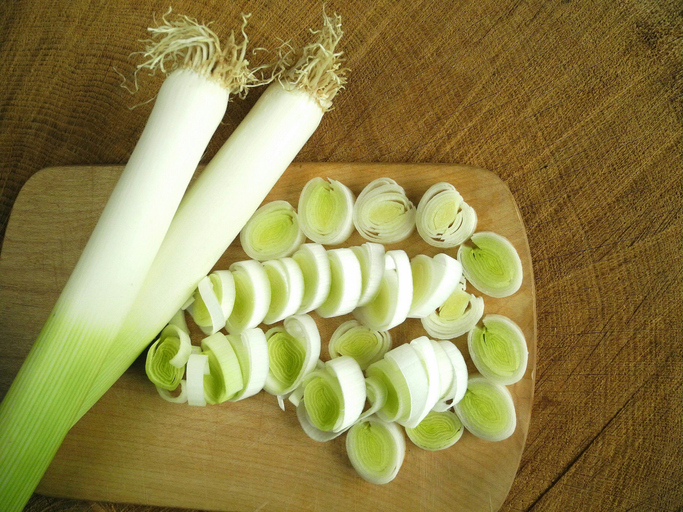Why We Are Loving Leeks!
Why We Are Loving Leeks!

It’s all about the quarantine cooking right now. And the healthier the better! Now more than ever, it is important to nourish our bodies with nutrient-dense foods in order to strengthen our immune systems and help ourselves fight off viruses and other harmful pathogens.
I’m a big fan of soups. They are great for packing in a bunch of vegetables, spices and herbs, and they are perfect to be stored as leftovers in the freezer. And lately, I have been fascinated with using leeks in my soups. Leeks is not very popular when it comes to our grocery shopping lists, so let’s discuss leeks!

A leek is a vegetable and is a member of the Allium plant family, along with garlic, onion, chive, shallot and scallion. Some might describe leeks as milder onions with a slightly sweeter taste. Leeks are very popular in France and the United Kingdom. In Wales, leeks are considered part of the country’s national emblem. And after exploring some of the potential benefits of leeks, I can see why they are so widely adored across the pond.
Leeks may be good for heart health.
As mentioned, leeks are part of the Allium plant family, and Allium vegetables are known to have cardiovascular health benefits. For example, a recent study published by the National Institutes of Health (NIH) found evidence which suggested that a higher intake of Allium vegetables was associated with a 64 percent reduced risk of cardiovascular outcomes.
“Furthermore, studies have demonstrated in vitro inhibition of platelet aggregation [the clumping together of platelets in the blood] of thiosulfinates, a class of organosulfur compounds found in allium vegetables such as garlic, onions, shallots, leeks and chives,” according to the NIH.
Leeks may reduce the risk of cancer.
A recent study conducted in China found evidence suggesting that consumption of Allium vegetables reduced the risk of colorectal cancer.
Leeks are also a good source of kaempferol.
“Kaempferol is a polyphenol antioxidant found in fruits and vegetables. Many studies have described the beneficial effects of dietary kaempferol in reducing the risk of chronic diseases, especially cancer. Epidemiological studies have shown an inverse relationship between kaempferol intake and cancer. Kaempferol may help by augmenting the body’s antioxidant defense against free radicals, which promote the development of cancer,” reports the National Institutes of Health (NIH).
Leeks may be good for gut health.
Leeks are a good source of prebiotics, and prebiotics are important to gut health. When it comes to maintaining a healthy gut microbiome, we need both prebiotics and probiotics. Prebiotics are the food for probiotics! Probiotics are living microorganisms, so they need to eat. In order for those good bacteria to flourish in your gut, you must also have prebiotics, which come in the form of fiber. However, while all prebiotics are fiber, not all fiber is considered prebiotic. In order for a food item to be considered prebiotic, there are a few criteria including that it resists gastric acidity, is fermented by the probiotics in your gut and it stimulates the growth and/or activity of intestinal bacteria potentially associated with health and well-being. Leeks do pass the test for being a good prebiotic.
Leeks are a good source of vitamin A.
Vitamin A is a nutrient that we all need. It’s great for bone health and just as important as other nutrients like vitamin C, vitamin D, calcium, iron, magnesium and others. Along with bone growth, vitamin A plays a role in vision, immune system health, reproduction, cell division and cell differentiation. Vitamin A is also a powerful antioxidant that helps fight inflammation by reducing free radical damage. This vitamin may even reduce the risk of heart disease.
Leeks are also a good source of vitamin C.
Vitamin C helps protect the immune system from deficiencies that may lead to cardiovascular illnesses and other diseases. It is one of the most important nutrients needed for our survival. It is also an antioxidant, which means it protects our bodies from free radicals and other harmful molecules. It is a major producer of collagen, which is the main ingredient behind the repair of bone and skin tissue, cartilage, ligaments, tendons and teeth. Vitamin C also helps moisturize and nourish the skin, which may increase skin elasticity and may even restore a youthful appearance. This vitamin may even help with complications from diabetes.
Preparing and eating leeks.The tough, fibrous green tops of a leek are not for eating, but you can make stock with them. The white and light green parts of the leek are for consumption. It is important to wash them well. You can chop the edible parts and then wash them. For additional tips, read here.
Try this healthy potato leek soup or this simple asparagus and leek soup.
As always, if you are pregnant, breastfeeding or have any existing health issues or are currently taking any medications, speak with a competent healthcare professional about what foods you are including in your diet.
Enjoy your healthy life!
The pH professional health care team includes recognized experts from a variety of health care and related disciplines, including physicians, attorneys, nutritionists, nurses and certified fitness instructors. This team also includes the members of the pH Medical Advisory Board, which constantly monitors all pH programs, products and services. To learn more about the pH Medical Advisory Board, click here.







